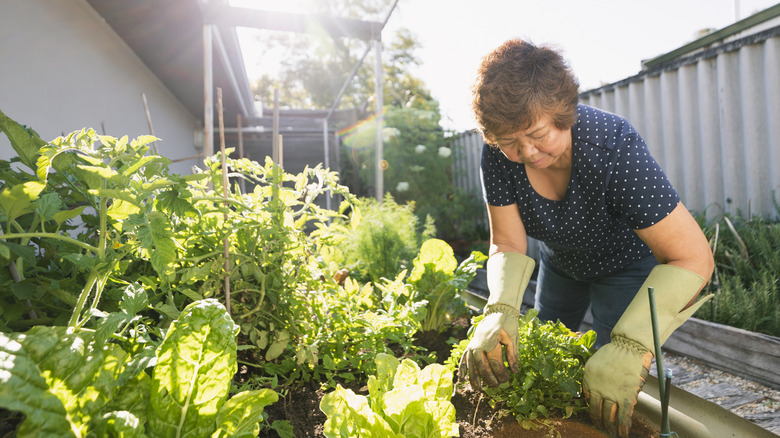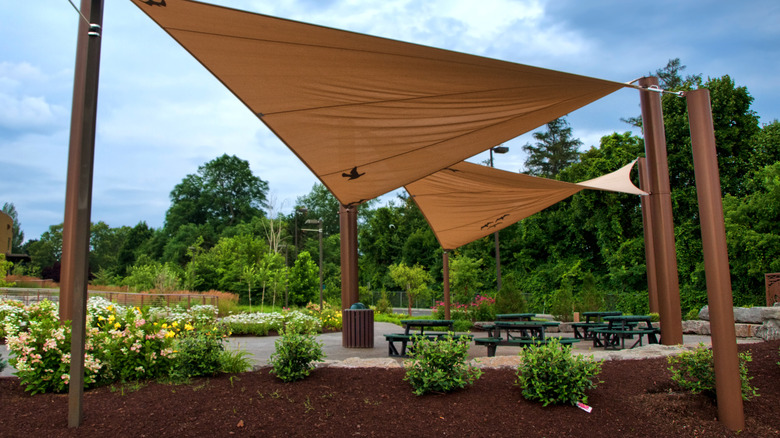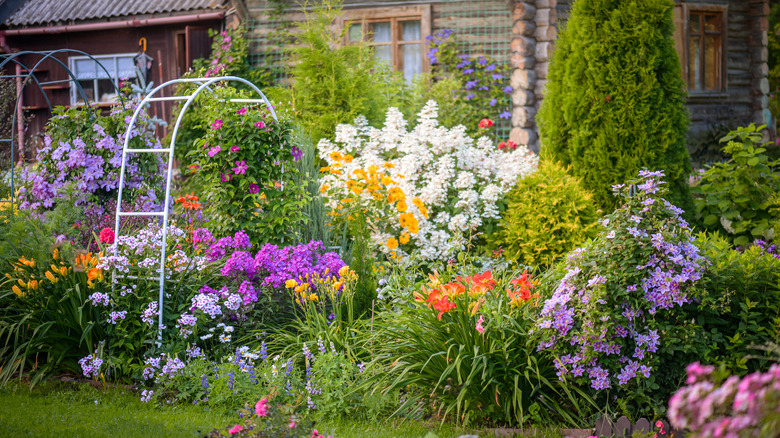Creative Ways To Shade Your Plants From The Brutally Hot Sun
When you spend time planting and growing your plants, you get a sense of pride as you see them start to bloom over the summer. Keeping your plants alive is the hardest part of the process. Every plant variety requires differing levels of water, sunlight, fertilizer, and soil — it can be challenging to keep track of them. However, you start learning your plant's needs over time and make adjustments. When you're living through the scorching months, you can't control where the sun sits, and some plants won't survive direct, hot sunlight for long hours. So, instead of letting your plants wither away in the hot sun, making shade covers for them will protect them from extreme direct heat.
Shade covers can be made from various materials, like polyethylene or polypropylene, that still allow the sun to shine on them without causing harm. Plants that benefit from shade covers are the ones planted in the middle of your yard without tree shade. Even garden beds deserve some shade throughout the day to prevent causing heat stress that could damage or wilt their foliage. Potted plants are easier to protect from the sun since you can move the containers to shadier areas in your backyard. You might increase their water intake slightly to keep them hydrated, but the sun won't get to them. As for your garden beds, using shade covers will keep them alive and healthy longer.
Shade cloths are a holy grail
When shorter plants grow in your garden without enough shade to protect their leaves and soil, extreme heat can cause them to dry out. Vegetable gardens are more prone to damage since most veggies don't grow tall or climb along trellises. However, other shorter plants or flowers can also be susceptible to damage. Using shade cloths helps protect your young plants and vegetables from the harsh sun rays.
Shade cloths are lightweight netting with tiny holes in them. When placed over plants, the holes allow sunlight and water to filter through, but the shade cloths prevent too much sun from beating down on the plants. You can create a canopy with a few garden hoops and drape the fabric over them to block the sunlight. Or, position a few metal poles and attach the cloth above the plants, creating a garden sail.
On the other hand, if you don't have the space to install a shade cloth canopy, using floating row covers works to provide shade for your plants. They're woven polyester cloths that you place directly over your plants and lay something heavy, like bricks, on the sides to prevent them from blowing away. They still allow sunlight and water to filter through, but they reduce the amount of sunlight your plants typically get and prevent pests from invading. There are light to heavy-weight covers. It's best to use lightweight covers; heavier-weight covers can suffocate your plants because they limit air circulation.
Cover your plants with more plants
While shade covers help protect your plants from the hot sun, they can be expensive and don't always look appealing in the garden. Instead of buying shade cloths or row covers, transplanting tall plants near your short plants will provide them with sufficient shade. Or, growing climbing plants, like ivy or squash, that require trellises will give your short plants a boost of shade. In addition, squash grows large leaves that can cover the soil and other growing flowers and plants from the sun. They'll still receive sunlight from different angles but won't get direct, harsh sunlight.
A few tall-growing plants you can add to your garden for extra shade are Bush Clematis. They are gorgeous violet flowers with deep green foliage that require support from trellises, giving any short-growing plants protection from direct sunlight. Pineapple lilies (Eucomis) are another excellent option to have in your garden. The lilies grow straight up, providing beautiful, vibrant flowers that add color to the space. While the flowers won't provide the shade, they have stunning long, green leaves that sprout from their base, making ideal shade coverings for plants. Overall, tall-growing perennials would make perfect additions for short plants exposed to direct sunlight.


